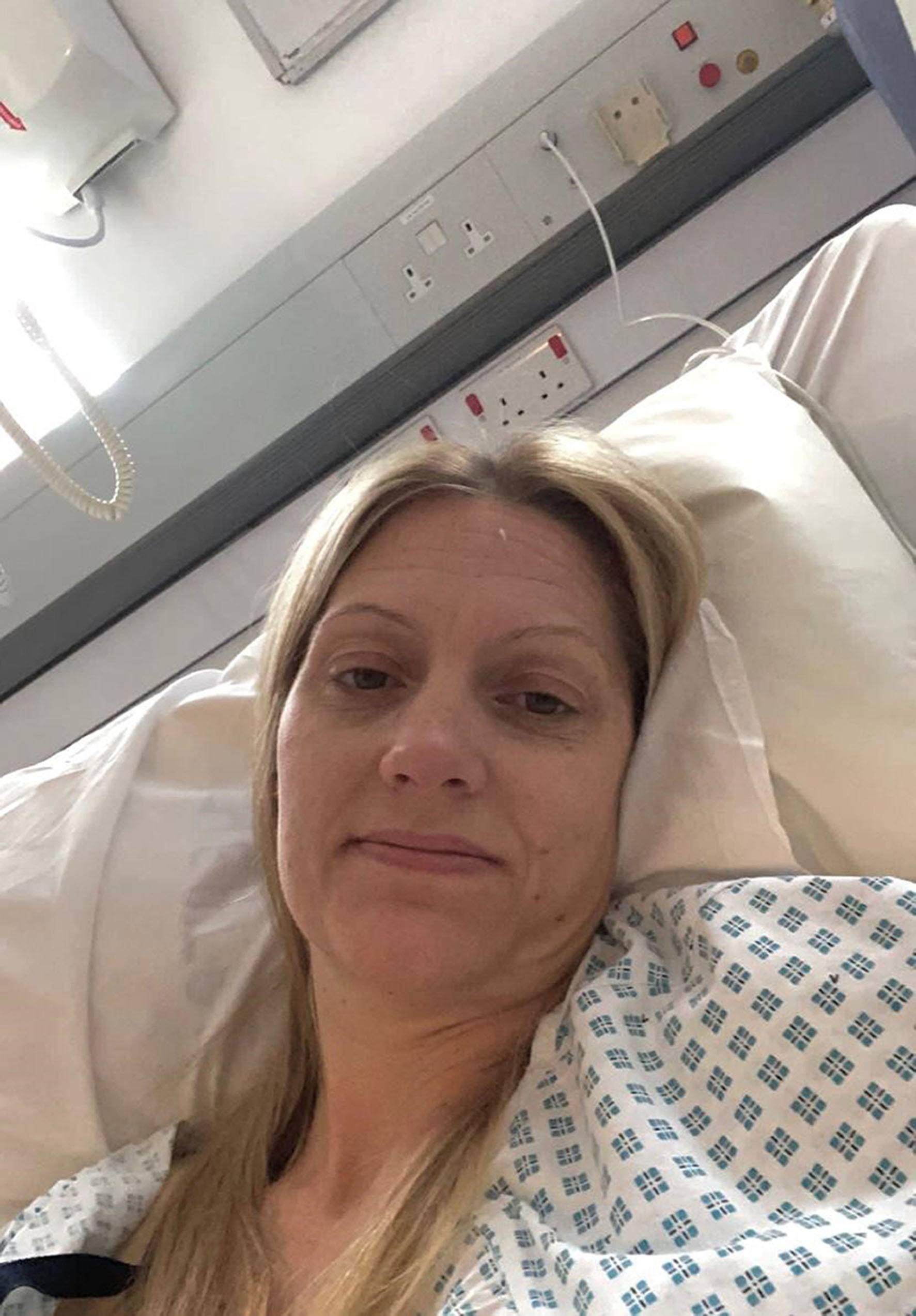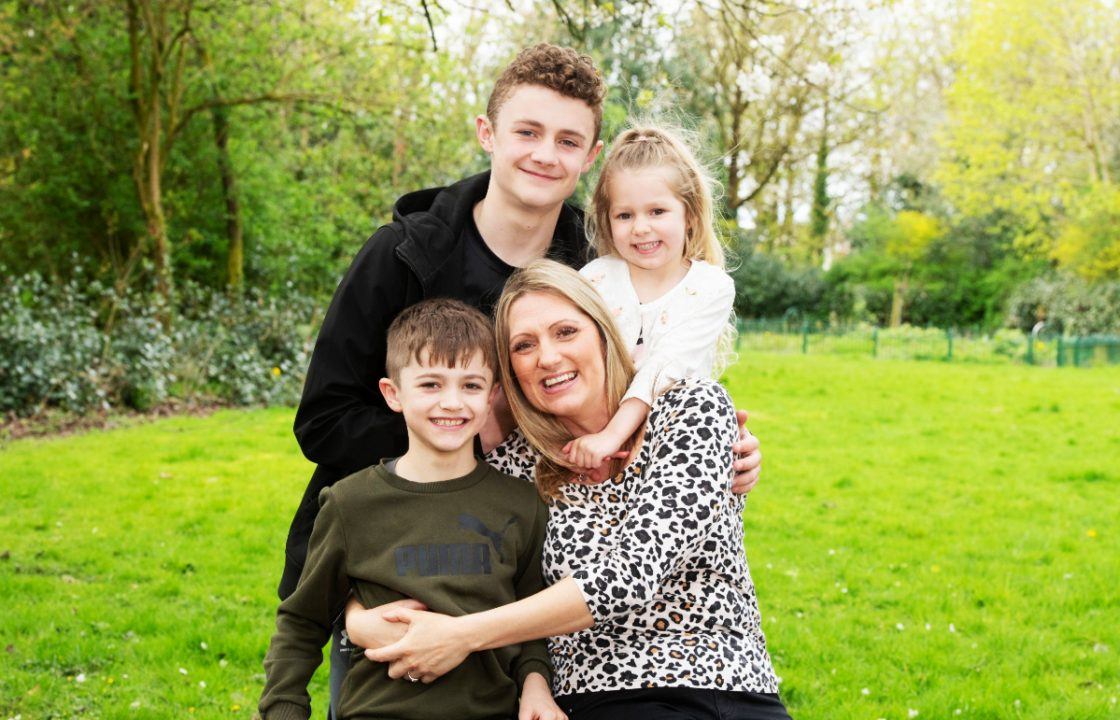A mother-of-three has told how Dame Deborah James helped save her life from deadly bowel cancer.
Lyndsey Ainscough, 40, from Leigh in Greater Manchester, was diagnosed with serious stage 3 cancer after suffering symptoms for several months.
The secondary school attendance manager only sought help after seeing campaigner Dame Deborah on TV in the weeks before her death on June 28, 2022 – two years ago this week.
Mrs Ainscough told the PA news agency she had been suffering issues such as bleeding and tiredness, but thought she had irritable bowel syndrome.
 PA Media
PA MediaNow, thanks to experimental immunotherapy treatment at the Christie NHS Foundation Trust in Manchester, she is free of cancer.
Dame Deborah’s mother, Heather, welcomed the news, saying it was an “honour to hear the impact” of her daughter’s work “through wonderful stories like Lyndsey’s”.
Mrs Ainscough told PA: “I’d been getting quite a lot of symptoms during the Covid lockdowns and had bleeding, weight loss and fatigue.
“I’d seen Deborah James was on the news and she was trying to highlight her story. It was one day that it clicked.
“I remember being in the kitchen ironing and she came on the news and she just mentioned something that caught my attention.
“And I turned to my husband and said: ‘Those are the symptoms I’ve been getting, maybe I’ve got bowel cancer’.
“He kind of just shrugged it off with ‘don’t be silly, you’re too young to have bowel cancer’. And it was from that moment that I actually decided to go and get checked.”
Mrs Ainscough’s GP sent her straight for a colonoscopy in June 2022 to examine the inside of her bowel.
“I thought I was going because I had got IBS or something like that because I’d always kind of had trouble with bloating,” she said.
“I really didn’t think anything of it at the time.
“I didn’t make a big deal out of it, my husband was working and I didn’t ask him to come with me or anything like that.
“I genuinely thought I was going to get diagnosed with IBS.
“My mum took me for the appointment and it was more or less confirmed there and then that it was rectal cancer.”
Mrs Ainscough, who was 38 at the time, had been chatting to nurses in the room when suddenly “there was an awful silence”.
She said: “I could see something on the screen – obviously I didn’t know what it was, but I knew it was something.
“It did not enter my mind for one minute that it could be cancer.
“The computer was switched off…and the nurse turned to me and said ‘did you see what was on the screen?’ I said ‘yeah, what is it?’ and she said ‘we’re not sure, but it’s highly likely to be cancer’.
“It’s really hard to explain what happened next to be honest, but I felt like the bed was closing in on me, it was complete shock, a complete shock.
“I had to ask her to repeat several times what she had said…..I thought ‘I’ve got cancer, I’m going to die’.”
Mrs Ainscough went home and told her husband Christian the devastating news.
The couple decided to tell their eldest child, Alfie, now aged 12, but felt their other children Perry, now four, and Spencer, now eight, were too young to understand.
“The worry was tremendous, particularly with having such young children,” Mrs Ainscough said.
“To be fair, (Alfie) did accept it quite well at the time, but that was probably one of the hardest things I’ve ever had to do.
“And telling my dad was one of the hardest things to do as well because my dad wasn’t there and it was totally unexpected. Telling him was horrific.”
There was more crushing news to come when doctors told Mrs Ainscough she was not suitable for surgery.
The tumour, which was 5cm in size, was on the outer lining of the bowel so could not be removed and a stoma would need to be fitted.
However, following a referral to the Christie in July, medics offered hope that she was eligible for a clinical trial of immunotherapy.
“It was a no-brainer, I was 100% going to take it,” Mrs Ainscough said.
She joined the trial in September 2022 and also underwent chemotherapy and radiotherapy, which led to symptoms such as loss of appetite and extreme fatigue.
“It was incredibly difficult, especially around Christmas-time which was my favourite time of year as well, and it was my son’s birthday,” she said.
However, there was good news to come.
Scans in January last year showed Mrs Ainscough was completely free of cancer – the immunotherapy combined with chemotherapy and radiotherapy had wiped out the disease.
“I felt like I’d been given another chance,” Mrs Ainscough said.
“I couldn’t believe it had actually gone. I thought they may have said it had shrunk and they were then ready to do surgery, but it was completely gone.
“A miracle.
“When they say there is a possibility of getting a full response, you don’t ever think that’s going to happen….when I heard that, it was just incredible.”
Since recovering, the Ainscoughs have been able to enjoy a family holiday and Mrs Ainscough’s family gave her a surprise birthday party for her 40th.
“My son went to Wembley with his school rugby team so I got to see that,” she said.
“My daughter starts school this year, so I get to see Perry start big school.
“All those things go through your mind when you’re going through the treatment – you’re not going to see it. How are your family ever going deal with that?”
Mrs Ainscough credits Dame Deborah’s awareness campaigns with making her seek out a diagnosis.
“Dame Deborah helped save my life,” she said.
“I think the fact she shared her story of having children – I know they’re not as young as mine – but she was a normal young woman with children, with this horrendous diagnosis.
“And it kind of just hits home that it can happen to normal people in all walks of life…it really doesn’t discriminate. It can hit anyone at any time.
“Literally seeing her on the screen that day openly talking about the importance of recognising symptoms and not being embarrassed, urged me to get checked. I have her to thank for that.”
Mrs Ainscough, who loves to play netball, now just needs three-monthly scans and monitoring to check the cancer has not come back.
Dame Deborah’s mother Heather said: “My daughter Deborah was a bright and brilliant campaigner for people affected by cancer.
“Her first instinct after receiving her diagnosis was to shout from the rooftops about bowel cancer and raise awareness so that others wouldn’t have to go through what she did.
“Deborah worked relentlessly to improve the lives of others right up until the end of her life, so it’s an honour to hear the impact of her work through wonderful stories like Lyndsey’s.
“Through the Bowelbabe Fund for Cancer Research UK, we hope to continue Deborah’s incredible legacy by spreading vital cancer awareness and funding cutting-edge research that will help give even more people affected by cancer more time with the people they love.”
The clinical trial at the Christie involves radiotherapy plus chemotherapy tablets for five weeks, together with the new immunotherapy drug durvalumab, which is given intravenously every four weeks for 16 weeks.
Dr Claire Arthur, consultant oncologist at the Christie, said: “We’re really pleased with Lyndsey’s outcome from the clinical trial.
“There’s no evidence of the tumour and she tolerated her treatment for rectal cancer (a type of bowel cancer) really well.
“We’re seeing an increase in colorectal cancers in young adults, so it’s important people who have possible symptoms don’t delay going to their GP and getting checked out.”
Follow STV News on WhatsApp
Scan the QR code on your mobile device for all the latest news from around the country


 PA Media
PA Media

























